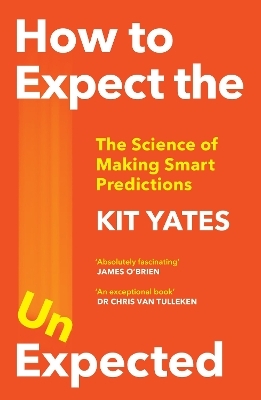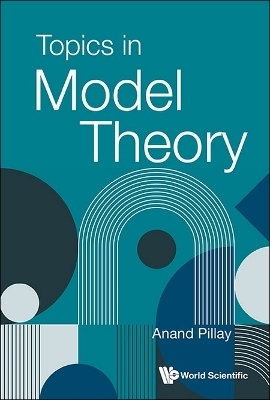
How to Expect the Unexpected
The Science of Making Smart Predictions
Seiten
2024
Quercus Publishing (Verlag)
978-1-5294-0869-0 (ISBN)
Quercus Publishing (Verlag)
978-1-5294-0869-0 (ISBN)
A fascinating exploration of how we can make better, accessible, mathematically-informed predictions about the world around us.
A Waterstones Best Popular Science Book of 2023
'Delightfully clear and vivid to read...A splendid book! Philip Pullman
'Absolutely fascinating' James O'Brien
'An exceptional book - readable, funny and more needed than ever' Dr Chris van Tulleken, bestselling author of Ultra-Processed People
· Are you more likely to become a professional footballer if your surname is Ball?
· How can you be one hundred per cent sure you will win a bet?
· Why did so many Pompeiians stay put while Mount Vesuvius was erupting?
· How do you prevent a nuclear war?
Ever since the dawn of human civilisation, we have been trying to make predictions about what's in store for us. We do this on a personal level, so that we can get on with our lives efficiently (should I hang my laundry out to dry, or will it rain?). But we also have to predict on a much larger scale, often for the good of our broader society (how can we spot economic downturns or prevent terrorist attacks?).
For just as long, we have been getting it wrong. From religious oracles to weather forecasters, and from politicians to economists, we are subjected to poor predictions all the time. Our job is to separate the good from the bad. Unfortunately, the foibles of our own biology - the biases that ultimately make us human - can let us down when it comes to making rational inferences about the world around us. And that can have disastrous consequences.
How to Expect the Unexpected will teach you how and why predictions go wrong, help you to spot phony forecasts and give you a better chance of getting your own predictions correct.
A Waterstones Best Popular Science Book of 2023
'Delightfully clear and vivid to read...A splendid book! Philip Pullman
'Absolutely fascinating' James O'Brien
'An exceptional book - readable, funny and more needed than ever' Dr Chris van Tulleken, bestselling author of Ultra-Processed People
· Are you more likely to become a professional footballer if your surname is Ball?
· How can you be one hundred per cent sure you will win a bet?
· Why did so many Pompeiians stay put while Mount Vesuvius was erupting?
· How do you prevent a nuclear war?
Ever since the dawn of human civilisation, we have been trying to make predictions about what's in store for us. We do this on a personal level, so that we can get on with our lives efficiently (should I hang my laundry out to dry, or will it rain?). But we also have to predict on a much larger scale, often for the good of our broader society (how can we spot economic downturns or prevent terrorist attacks?).
For just as long, we have been getting it wrong. From religious oracles to weather forecasters, and from politicians to economists, we are subjected to poor predictions all the time. Our job is to separate the good from the bad. Unfortunately, the foibles of our own biology - the biases that ultimately make us human - can let us down when it comes to making rational inferences about the world around us. And that can have disastrous consequences.
How to Expect the Unexpected will teach you how and why predictions go wrong, help you to spot phony forecasts and give you a better chance of getting your own predictions correct.
Kit Yates is a Senior Lecturer in the Department of Mathematical Sciences and co-director of the Centre for Mathematical Biology at the University of Bath. He completed his PhD in mathematics at the University of Oxford in 2011. He is the author of The Maths of Life and Death, which was a Sunday Times Science Book of the Year. This is his second book.
| Erscheinungsdatum | 22.08.2024 |
|---|---|
| Verlagsort | London |
| Sprache | englisch |
| Maße | 128 x 192 mm |
| Gewicht | 315 g |
| Themenwelt | Sachbuch/Ratgeber ► Natur / Technik |
| Mathematik / Informatik ► Mathematik ► Logik / Mengenlehre | |
| ISBN-10 | 1-5294-0869-5 / 1529408695 |
| ISBN-13 | 978-1-5294-0869-0 / 9781529408690 |
| Zustand | Neuware |
| Informationen gemäß Produktsicherheitsverordnung (GPSR) | |
| Haben Sie eine Frage zum Produkt? |
Mehr entdecken
aus dem Bereich
aus dem Bereich
what we have that machines don't
Buch | Softcover (2024)
Profile Books Ltd (Verlag)
13,70 €
Buch | Softcover (2024)
World Scientific Publishing Co Pte Ltd (Verlag)
31,15 €
how simple questions lead us to mathematics’ deepest truths
Buch | Softcover (2024)
Profile Books Ltd (Verlag)
13,70 €


